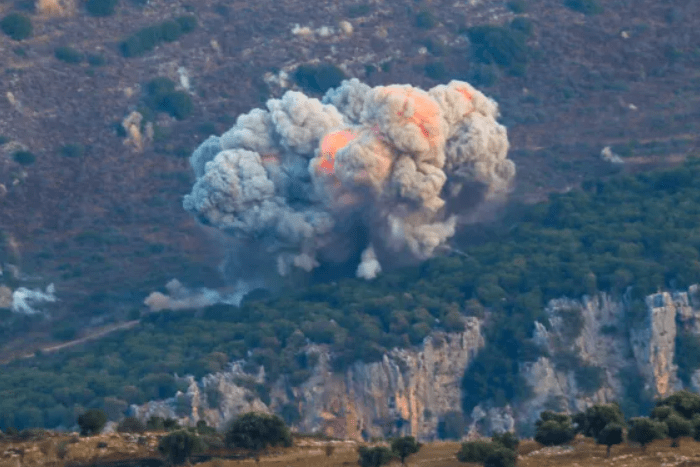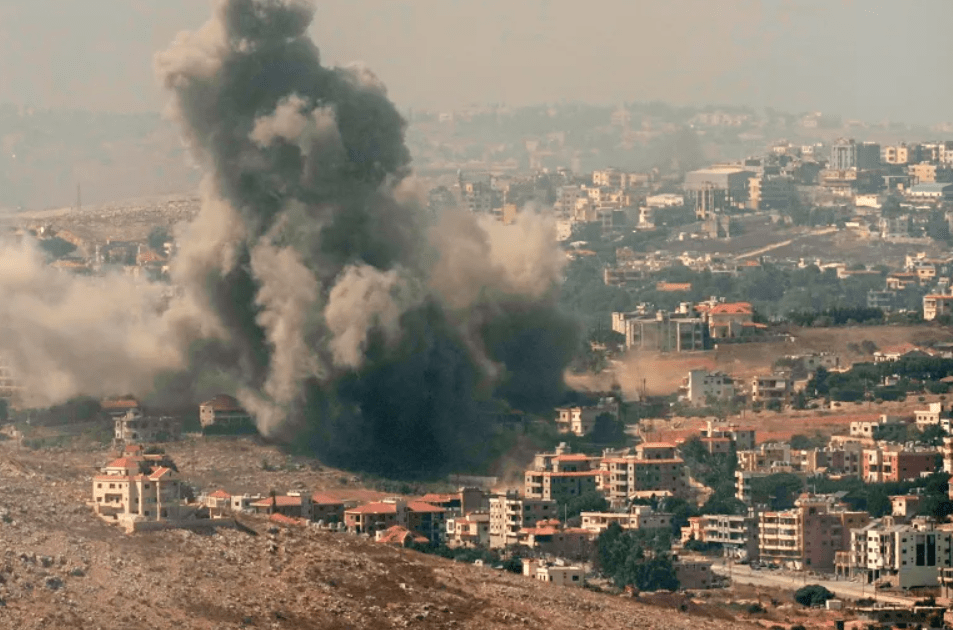Israeli airstrikes have killed at least 492 people in Lebanon, marking the deadliest day of conflict in nearly two decades, according to the Lebanese health ministry.
The strikes, targeting Hezbollah positions, have triggered a major escalation in violence, forcing thousands of families to flee their homes as bombardments hit multiple regions, including southern Lebanon and the capital, Beirut. Global leaders have expressed urgent concern over the intensifying conflict.
The Israeli military reported hitting 1,300 Hezbollah sites, targeting infrastructure that the armed group has built since the 2006 war. In response, Hezbollah fired over 200 rockets into northern Israel, injuring two civilians. The situation is seen as spiralling dangerously close to a full-scale war, drawing calls for restraint from world leaders.

Among the dead in Lebanon are 35 children and 58 women, with more than 1,600 others wounded. While it remains unclear how many of the casualties were civilians, Lebanon’s Health Minister Firass Abiad confirmed the high number of displaced families.
“Thousands have been forced to leave their homes due to the ongoing strikes,” Abiad said, highlighting the growing humanitarian crisis.
The international community has expressed growing alarm at the violence. UN Secretary-General António Guterres voiced concern over the potential for Lebanon to descend into a situation similar to Gaza, while EU foreign policy chief Josep Borrell warned that the escalation is “extremely dangerous and worrying.”
At a UN gathering in New York, Borrell cautioned that the region is “on the verge of a full-fledged war.”
President Joe Biden stated that the United States is working to de-escalate the conflict, prioritising efforts to ensure the safety of civilians.
Meanwhile, the Pentagon has announced the deployment of additional troops to the Middle East, citing a precautionary measure in light of the rising tensions.
“We are sending a small number of US military personnel forward to augment our forces that are already in the region,” said Pentagon spokesperson Maj Gen Pat Ryder.
The surge in violence follows nearly a year of cross-border conflict between Israel and Hezbollah, spurred by the war in Gaza. Hundreds of lives have already been lost, most of them Hezbollah fighters, with tens of thousands displaced on both sides.
Hezbollah, an Iran-backed militant group, has pledged to continue its actions in solidarity with Hamas, stating it will only cease hostilities once a ceasefire is reached in Gaza.
Lebanese media reported that the first wave of Israeli airstrikes began early Monday morning, with missiles striking towns and villages across southern Lebanon and the eastern Bekaa Valley.
The capital Beirut was also hit, with one of the strikes targeting a building in Bir al-Abed, a suburb where Hezbollah operates. Though Israeli forces believed the strike may have targeted senior Hezbollah commander Ali Karaki, the group later confirmed that Karaki was unharmed and had relocated to a safe location.
Amid the chaos, roads leading from southern Lebanon to Beirut were choked with traffic as families attempted to flee. Many had received warnings from the Israeli military, urging them to evacuate areas where Hezbollah was believed to be storing weapons.
“We just had to flee,” said one father of four, as he and his family made their way to Tripoli.
In a statement, Israeli Prime Minister Benjamin Netanyahu called on the Lebanese people to “get out of harm’s way,” accusing Hezbollah of using civilians as human shields.
“Hezbollah has placed rockets in your living rooms and missiles in your garage,” Netanyahu said, justifying the airstrikes as necessary to protect Israeli civilians from attacks.
Israeli military officials stated that the air campaign is focused on degrading Hezbollah’s capacity to launch further rocket attacks, dismantling the group’s elite Radwan Force, and pushing fighters back from the Israel-Lebanon border.
While Hezbollah has so far announced the death of one fighter in the strikes, Israel’s airstrikes caused significant secondary explosions in areas where weapons were reportedly hidden, potentially contributing to the death toll.
Hezbollah responded to the Israeli strikes with a barrage of rockets, with the Israel Defense Forces (IDF) confirming that 210 projectiles were launched from Lebanon into Israeli territory by Monday evening.
Some rockets reached as far as the northern Israeli city of Haifa, and homes were damaged in the Lower Galilee region.
One resident described the harrowing moment when his family narrowly avoided a direct hit: “It’s a metre from life to death,” said David Yitzhak, whose house was struck while his family sought shelter.
The conflict between Israel and Hezbollah shows no signs of abating, with both sides engaging in escalating attacks.
Hezbollah’s deputy leader, Naim Qassem, declared that the group had entered “a new phase” of confrontation, framing the conflict as an “open-ended battle of reckoning.”

